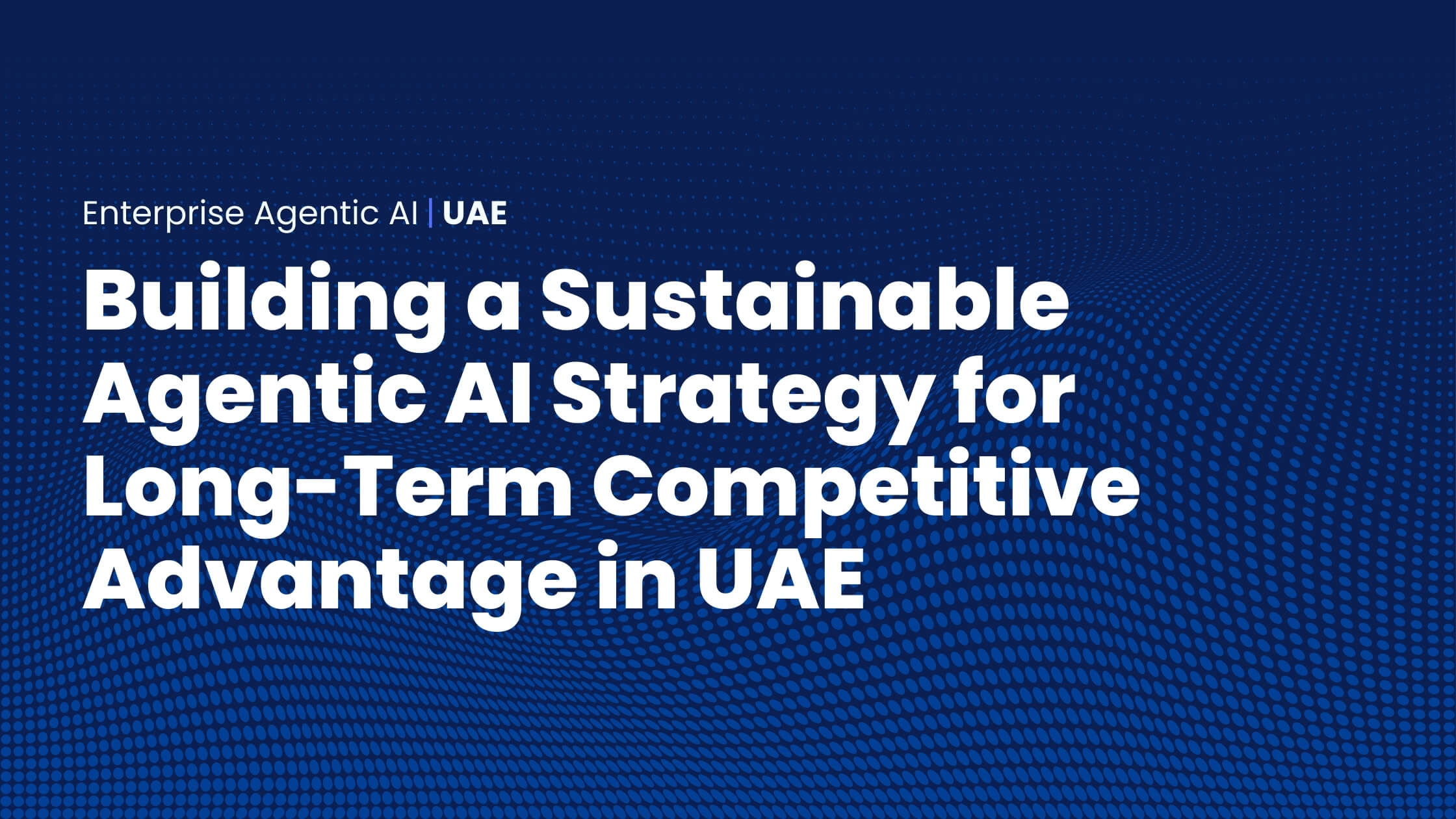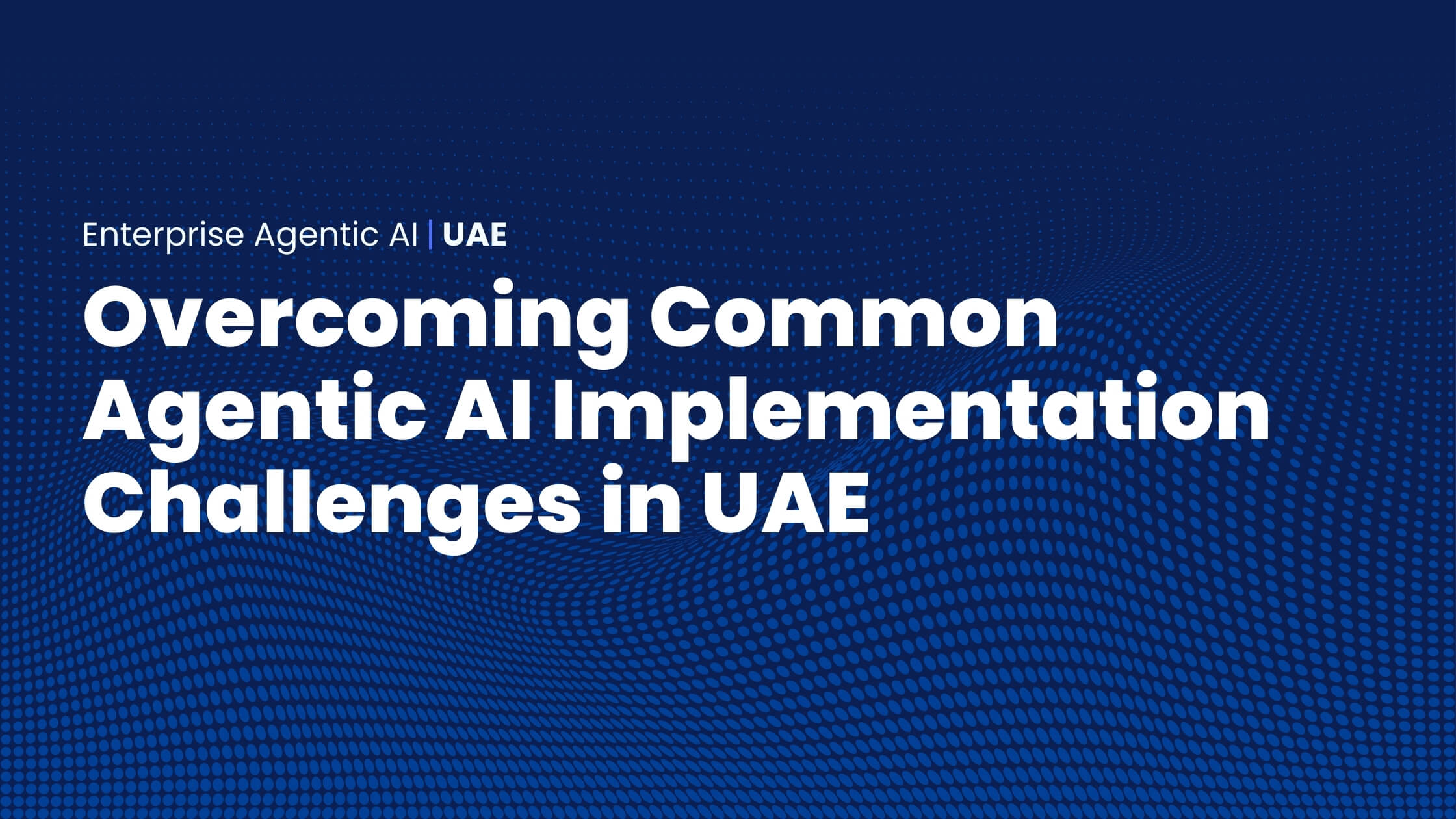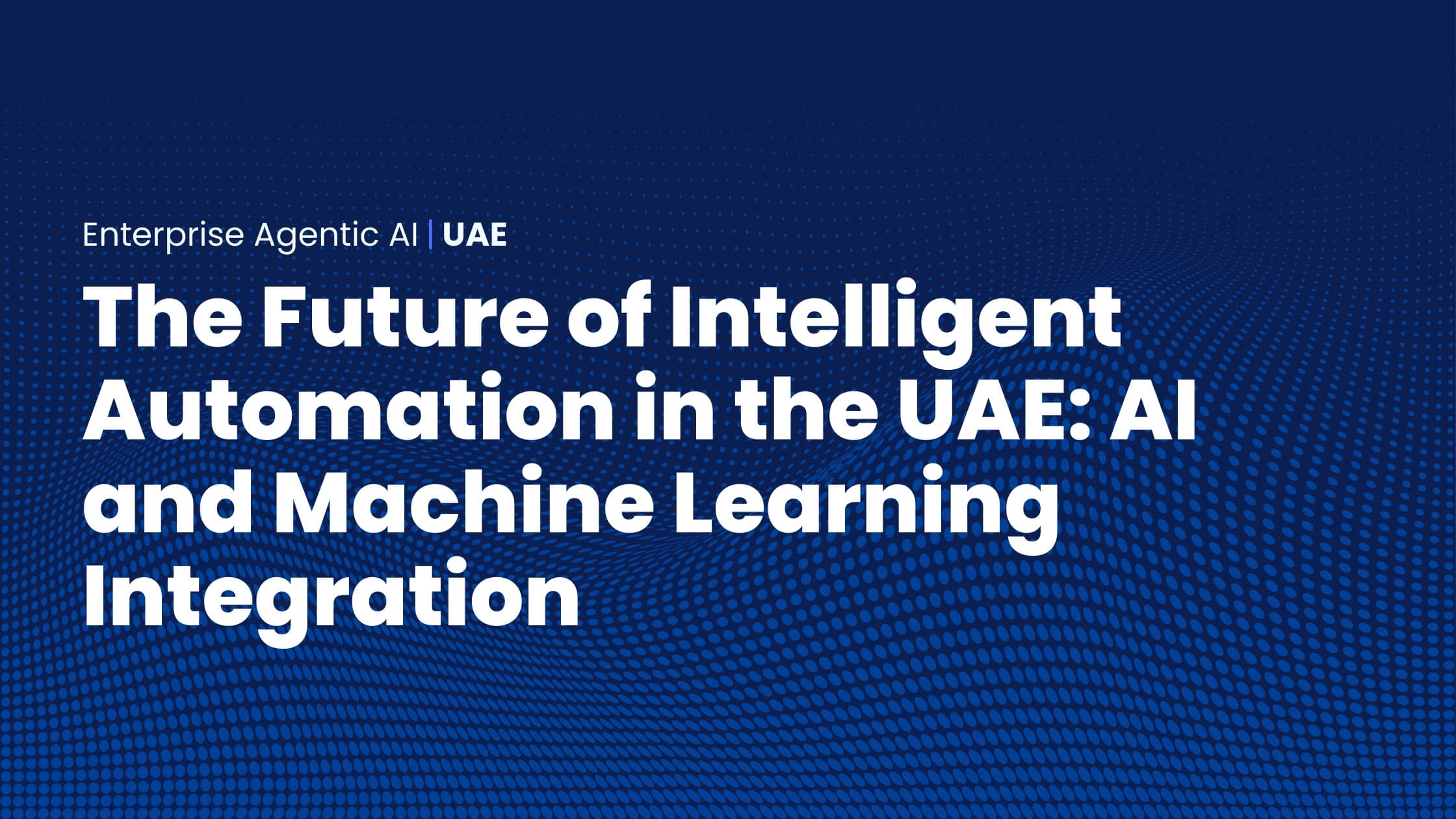December 24, 2025
Building a Sustainable Agentic AI Strategy for Long-Term Competitive Advantage in the UAEWhen the UAE's AI governance regulations began intensifying in 2024, most organisations reacted predictably: they viewed governance as a compliance obligation, a cost centre, a constraint on innovation. Legal teams drafted policies. Compliance officers created checklists. Finance questioned the ROI of governance investments.
A smaller group of organisations saw something different. They recognised that in a market where AI governance would become universal, excellence in governance would become rare, and therefore valuable. Whilst competitors grudgingly ticked boxes, these leaders built governance capabilities that attracted customers, recruited top talent, accelerated innovation, and earned regulatory recognition.
Eighteen months later, the performance gap is visible. Organisations that embraced AI governance as strategic capability are capturing market share, winning enterprise deals, and positioning themselves as industry leaders. Those that treated it as compliance theatre are playing defensive catch-up, explaining incidents to boards, and losing deals to governance-mature competitors.
The question facing your organisation isn't whether to implement AI governance. UAE regulators have made that non-negotiable. The question is whether you'll view it as a burden to minimise or an opportunity to maximise.
The difference between checkbox compliance and governance excellence isn't just investment level. It's fundamental mindset.
Checkbox compliance asks: What's the minimum we must do to avoid penalties? How do we demonstrate compliance with least effort? Can we delay investments until enforcement forces action?
Governance excellence asks: How do we build AI systems stakeholders trust completely? What capabilities give us competitive advantages? How do we make governance enable rather than constrain innovation?
This mindset shift transforms outcomes. Consider two UAE financial institutions facing identical regulatory requirements:
Institution A creates policies to satisfy regulators, implements minimal monitoring, trains employees on what not to do, and hopes AI incidents don't occur. They spend AED 2 to 3 million on basic compliance infrastructure and view it as pure cost.
Institution B builds comprehensive governance capabilities, implements advanced monitoring and explainability tools, creates centres of excellence, and actively markets their responsible AI commitment. They invest AED 8 to 10 million but generate measurable returns through customer acquisition, talent recruitment, and operational efficiency.
Which organisation wins the next major enterprise banking contract when the customer explicitly asks: "How do you ensure your AI doesn't discriminate against our diverse employee base?" Which attracts the top AI engineers who want to work on systems that benefit society? Which receives preferential treatment when regulators evaluate innovative AI applications for sandbox participation?
Institution B wins every time. Their additional investment isn't cost. It's differentiation.
Winners treat AI governance as:
They recognise that in UAE's rapidly maturing AI market, governance excellence is becoming table stakes for premium segments whilst creating clear separation from competitors in every segment.
The UAE's position as an AI governance pioneer creates unique advantages for organisations building governance capabilities here. The regulations mirror and often exceed EU AI Act requirements, UK approaches, and emerging global standards. This means governance capabilities built for UAE compliance simultaneously prepare organisations for:
Organisations viewing UAE governance requirements as regional constraints miss the strategic picture: you're building capabilities that unlock global opportunities.
Let's move beyond abstract assertions to specific, measurable advantages that governance excellence creates.
In an era of AI scepticism following high-profile failures globally (discriminatory algorithms, privacy breaches, hallucinating chatbots) customers increasingly prefer organisations demonstrating responsible AI practices.
B2B impact: When enterprise customers evaluate vendors, AI governance questions now appear in RFPs and security questionnaires. "Describe your AI governance framework" and "How do you ensure your AI doesn't create bias?" are standard due diligence questions. Organisations with mature governance capabilities win these evaluations. Those without adequate answers don't make shortlists.
B2C impact: Consumer research consistently shows that trust influences purchasing decisions, particularly for financial services, healthcare, and personal data-intensive products. Organisations transparently communicating their AI governance ("Our AI is independently audited for fairness," "We maintain human oversight of all credit decisions") build competitive differentiation.
Partnership opportunities: Major technology platforms increasingly require governance commitments from partners. Financial institutions need AI governance assurances from fintech partners. Healthcare systems demand transparency from medical AI vendors. Government agencies require compliance documentation from service providers.
ROI measurement: Track win rates on deals where AI governance was discussed. Monitor customer acquisition cost differences for governance-enabled marketing. Measure partnership opportunities gained through governance credibility.
One UAE fintech reported that adding AI governance transparency to their sales materials increased enterprise deal win rates by 23% and shortened sales cycles by 35 days average, because governance documentation eliminated customer concerns that previously stalled decisions.
The global competition for AI talent is fierce. Top data scientists, ML engineers, and AI researchers have choices about where they work. Increasingly, they choose organisations with strong ethical frameworks.
Talent preferences: Surveys of AI professionals consistently find that 60% to 70% consider an employer's AI ethics and governance practices when evaluating opportunities. They want to work on AI systems that benefit society, not create harm. They seek environments where governance enables doing things right, not bureaucracy that prevents doing things at all.
Recruiting advantage: Organisations known for responsible AI governance recruit more successfully. When your company appears in industry publications for AI governance leadership, top candidates notice. When your employees speak at conferences about your governance practices, you build employer brand.
Retention impact: AI professionals stay longer at organisations where they're proud of the work. Governance excellence reduces turnover in expensive, difficult-to-replace technical roles.
ROI measurement: Track time-to-fill for AI roles, offer acceptance rates, and retention metrics. Calculate the cost savings from reduced turnover and faster recruitment.
Emirates NBD publicly committed to responsible AI principles and publishes transparency reports. Their AI talent retention improved by 18% year-over-year, and they report receiving 2.5 times more applications per AI role opening than before highlighting governance commitment.
Robust governance prevents costly AI failures that damage reputation and customer relationships. The mathematics strongly favour prevention over incident response.
Incident costs: When AI systems fail badly, costs accumulate across multiple dimensions:
Governance investment: Comprehensive governance (tools, processes, training, personnel) typically costs AED 5 to 15 million for mid-large organisations to establish, plus AED 2 to 5 million annually to maintain.
The calculation: A single serious AI incident can easily cost AED 20 to 50 million when all factors are included. Prevention through governance provides positive ROI if it prevents even one major incident over 3 to 5 years, and it typically prevents multiple incidents.
ROI measurement: Track incidents prevented through governance controls (bias detected before deployment, hallucinations caught in testing, unauthorised AI usage blocked). Estimate incident costs avoided.
This advantage surprises many executives because it seems counterintuitive: How can governance requirements accelerate innovation rather than slow it?
The answer lies in confidence and clarity. When development teams understand governance requirements upfront, they build compliant systems from the start rather than discovering compliance issues late in development that require costly redesigns.
Clear approval paths: Well-designed governance provides transparent criteria for AI deployment approval. Teams know exactly what testing, documentation, and review is required. This eliminates ambiguity that previously stalled projects whilst stakeholders debated whether approval was needed.
Risk-based approaches: Governance frameworks that classify AI by risk level enable fast-tracking of lower-risk applications whilst appropriately scrutinising high-risk ones. Without classification, organisations either over-govern everything (slowing innovation) or under-govern everything (creating incidents).
Sandbox environments: Organisations with mature governance can create regulatory-approved sandbox environments where teams test innovative AI applications with appropriate oversight. DIFC's AI Regulatory Sandbox exemplifies this. Participants innovate faster because governance frameworks enable experimentation within guardrails.
ROI measurement: Track time-from-concept-to-deployment for AI projects before and after implementing governance frameworks. Measure reduction in late-stage project failures due to compliance issues. Count innovative AI applications deployed that previously would have been blocked due to unclear governance.
One DIFC-based fintech reported that implementing clear AI governance actually reduced their average AI project timeline from 8 months to 5.5 months, because teams no longer spent months debating risk and approval, instead following defined processes.
UAE regulators have signalled clearly that organisations demonstrating AI governance excellence receive preferential consideration for various opportunities.
Sandbox participation: DIFC and ADGM regulatory sandboxes (which enable testing innovative AI applications with regulatory supervision) prioritise organisations with strong governance foundations. Regulators want to work with companies that take governance seriously.
Digital transformation partnerships: Government entities seeking AI-powered services prefer vendors with demonstrated governance maturity. Public sector procurement increasingly includes AI governance evaluation criteria.
Faster approvals: When governance-mature organisations submit applications for new AI-powered services, regulators process them more efficiently because adequate documentation and controls are evident. Organisations with governance gaps face extended back-and-forth seeking clarifications.
Regulatory dialogue: Regulators consult governance-leading organisations when developing new requirements, creating opportunities to influence standards whilst building relationships.
ROI measurement: Track regulatory approval timelines, sandbox participation acceptance, and public sector contract wins influenced by governance capabilities.
As AI becomes ubiquitous, "responsible AI" is emerging as a brand differentiator, similar to how "data security" and "privacy protection" became competitive features in previous decades.
Marketing positioning: Organisations can market governance excellence: "Our AI is independently certified for fairness," "We maintain the highest standards of AI transparency," "Our governance framework exceeds UAE regulatory requirements."
Industry leadership: Being recognised as an AI governance leader (through awards, media coverage, conference speaking) creates brand value and market positioning that attracts customers and partners.
Premium pricing power: In some segments, governance excellence enables premium pricing. Enterprise customers pay more for vendors they trust completely. Consumers pay premiums for brands they believe act responsibly.
ROI measurement: Track brand perception metrics, media mentions of governance practices, competitive win rates when governance is discussed, and pricing power in customer segments valuing responsibility.
Let's examine specific examples of UAE organisations turning governance into advantage.
Both banks have publicly committed to responsible AI principles and publish information about their governance practices. This transparency serves multiple purposes:
Customer confidence: Publishing AI governance frameworks reassures customers that the bank takes responsibility seriously. This matters particularly for credit decisions, fraud detection, and other AI applications directly affecting customers.
Talent recruitment: Public commitments attract AI professionals who want employers aligned with their values. Both banks report improved recruitment and retention in AI roles.
Regulatory relationships: Transparent governance demonstrates to CBUAE that these institutions are serious about compliance, earning regulatory recognition as industry leaders.
Competitive positioning: When competing for enterprise banking relationships, governance transparency differentiates them from competitors who can't or won't discuss their AI practices.
Lesson: Transparency about governance (within reasonable bounds that don't reveal competitive secrets) creates more value than secrecy.
UAE government entities operate under the principle that public sector AI must set standards that private sector organisations aspire to meet. The Ministry of Justice's AI-powered virtual assistant "Aisha" demonstrates this:
Government AI implementations prove that strong governance and innovative applications coexist successfully.
Lesson: Governance doesn't prevent innovation. It ensures innovation is responsible and sustainable.
Organisations participating in DIFC's AI and Emerging Technology Regulatory Sandbox demonstrate how governance frameworks enable rather than constrain innovation:
Lesson: Engaging proactively with regulators through sandboxes and dialogue creates advantages over waiting for permissions passively.
How do you translate these insights into strategic investment decisions?
Evaluate governance investments through strategic lenses, not just compliance cost:
Customer impact: Will this governance capability help us win customers, retain them longer, or enable premium pricing?
Talent impact: Does this investment make us more attractive to AI professionals we want to recruit and retain?
Risk impact: What incidents does this prevent, and what are those incidents worth avoiding?
Innovation impact: Does this enable AI applications we couldn't deploy without it?
Regulatory impact: Will this create preferential treatment, partnership opportunities, or market access?
Governance investments that score highly across multiple dimensions are strategic priorities, not optional expenses.
Build momentum with visible governance actions:
These actions signal seriousness whilst building foundations for deeper capabilities.
Strategic governance investments that competitors can't easily replicate:
Track both defensive (risk reduction) and offensive (opportunity capture) returns:
Defensive metrics:
Offensive metrics:
UAE's AI governance landscape will continue evolving rapidly. Organisations should prepare for:
2026-2027 regulatory developments:
Market maturity shifts:
Organisations building governance capabilities now gain compounding advantages:
Learning curves: Governance expertise takes time to develop. Early starters accumulate knowledge and experience that later entrants lack.
Talent concentration: Top AI professionals gravitate towards governance leaders. Once talent concentrations form, they're self-reinforcing.
Customer relationships: Enterprise customers that select governance-mature vendors develop sticky relationships. Switching costs favour incumbents.
Regulatory recognition: Established relationships and track records with regulators create ongoing advantages.
Brand positioning: First movers in "responsible AI" positioning capture mindshare that followers struggle to displace.
Every organisation faces the same choice:
Lead: Invest strategically in governance excellence now, capture competitive advantages, shape industry standards, attract top talent, win premium customers, and earn regulatory recognition.
Follow: Implement minimum compliance, play defence, compete on commoditised dimensions, struggle to attract talent, explain incidents to boards, and watch governance leaders dominate.
The investment delta between these paths is smaller than you think, perhaps 2 to 3 times for excellence versus adequacy. But the outcome delta is enormous and grows over time.
The future belongs to organisations that recognise AI governance excellence as strategic capability, not compliance burden. The question is whether your organisation will be amongst them.
Start Your AI Governance Transformation
Schedule a strategic consultation with our AI governance experts to assess your current capabilities, identify competitive opportunities, and build your roadmap to governance excellence that creates measurable business advantage.
[BEGIN YOUR TRANSFORMATION]
____
This concludes our six-part series on UAE AI Governance.
We have covered the regulatory landscape the 12 Charter principles, generative AI challenges, financial services requirements, implementation methodology, and strategic opportunity. The knowledge is yours. The choice is yours. The future awaits.

Stay Informed: Engage with our Blog for Expert Analysis, Industry Updates, and Insider Perspectives



let’s design the governance framework your AI strategy deserves
.webp)
.webp) Let's Talk
Let's Talk